四级听力四大题型全解析
(英语四级听力)大学英语四级听力题型题型及答题技巧
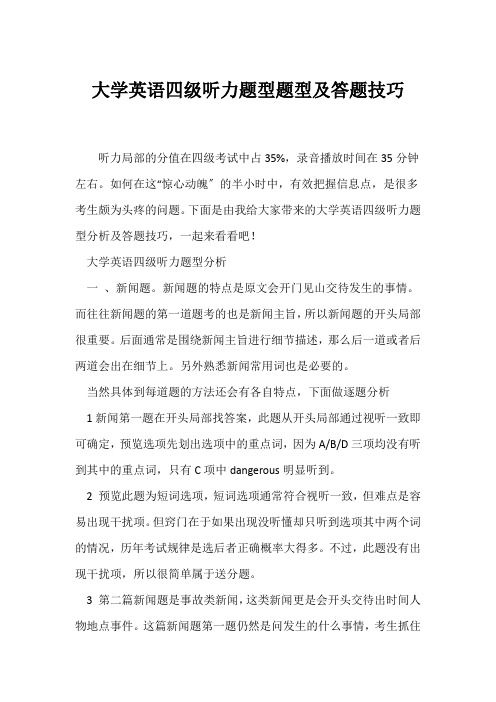
大学英语四级听力题型题型及答题技巧听力局部的分值在四级考试中占35%,录音播放时间在35分钟左右。
如何在这“惊心动魄〞的半小时中,有效把握信息点,是很多考生颇为头疼的问题。
下面是由我给大家带来的大学英语四级听力题型分析及答题技巧,一起来看看吧!大学英语四级听力题型分析一、新闻题。
新闻题的特点是原文会开门见山交待发生的事情。
而往往新闻题的第一道题考的也是新闻主旨,所以新闻题的开头局部很重要。
后面通常是围绕新闻主旨进行细节描述,那么后一道或者后两道会出在细节上。
另外熟悉新闻常用词也是必要的。
当然具体到每道题的方法还会有各自特点,下面做逐题分析1新闻第一题在开头局部找答案,此题从开头局部通过视听一致即可确定,预览选项先划出选项中的重点词,因为A/B/D三项均没有听到其中的重点词,只有C项中dangerous明显听到。
2 预览此题为短词选项,短词选项通常符合视听一致,但难点是容易出现干扰项。
但窍门在于如果出现没听懂却只听到选项其中两个词的情况,历年考试规律是选后者正确概率大得多。
不过,此题没有出现干扰项,所以很简单属于送分题。
3 第二篇新闻题是事故类新闻,这类新闻更是会开头交待出时间人物地点事件。
这篇新闻题第一题仍然是问发生的什么事情,考生抓住开头介绍,视听一致确定答案。
4抓住关键词: so that ,关键词加视听一致即可。
5 第三个新闻题第一题仍旧考题出在新闻主旨上,同样的方法,简单预览选项,文章开头第一句视听一致。
6此题是细节题。
考生应该注意的是新闻题中遇到“目击证人说/有关部门说/相关研究人员说〞这类句子要认真听,此处容易出题。
此题,原文中announce(宣称)后视听一致确定答案。
7同样新闻题中出现时效性的分析或者预测都会是考点,所以诸如某人predict/estimate/ assess/confirm这样的句子时认真听,此题he estimated that…后面视听一致很容易听到lose jobs,此题无干扰项,容易确定答案。
英语四级听力题型分析及解题技巧
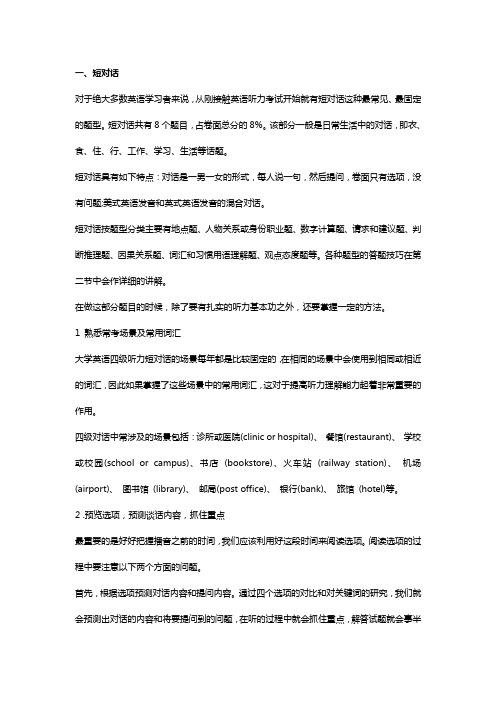
一、短对话对于绝大多数英语学习者来说,从刚接触英语听力考试开始就有短对话这种最常见、最固定的题型。
短对话共有8个题目,占卷面总分的8%。
该部分一般是日常生活中的对话,即衣、食、住、行、工作、学习、生活等话题。
短对话具有如下特点:对话是一男一女的形式,每人说一句,然后提问,卷面只有选项,没有问题;美式英语发音和英式英语发音的混合对话。
短对话按题型分类主要有地点题、人物关系或身份职业题、数字计算题、请求和建议题、判断推理题、因果关系题、词汇和习惯用语理解题、观点态度题等。
各种题型的答题技巧在第二节中会作详细的讲解。
在做这部分题目的时候,除了要有扎实的听力基本功之外,还要掌握一定的方法。
1 熟悉常考场景及常用词汇大学英语四级听力短对话的场景每年都是比较固定的,在相同的场景中会使用到相同或相近的词汇,因此如果掌握了这些场景中的常用词汇,这对于提高听力理解能力起着非常重要的作用。
四级对话中常涉及的场景包括:诊所或医院(clinic or hospital)、餐馆(restaurant)、学校或校园(school or campus)、书店(bookstore)、火车站(railway station)、机场(airport)、图书馆(library)、邮局(post office)、银行(bank)、旅馆(hotel)等。
2 .预览选项,预测谈话内容,抓住重点最重要的是好好把握播音之前的时间,我们应该利用好这段时间来阅读选项。
阅读选项的过程中要注意以下两个方面的问题。
首先,根据选项预测对话内容和提问内容。
通过四个选项的对比和对关键词的研究,我们就会预测出对话的内容和将要提问到的问题,在听的过程中就会抓住重点,解答试题就会事半功倍。
【典型例题】(2006年6月)12. A) The woman does her own housework.B) The woman needs a housekeeper.C) The woman’s house is in a mess.D) The woman works as a housekeeper.显而易见,此题是有关housework的问题,因为四个选项中分别出现了does housework, needs housekeeper, house mess, work as housekeeper;由此推断此题是关于做家务方面的一个谈话,在听这则对话时,就可以轻而易举地对号入座了。
英语四级听力考试短对话必考题型解密
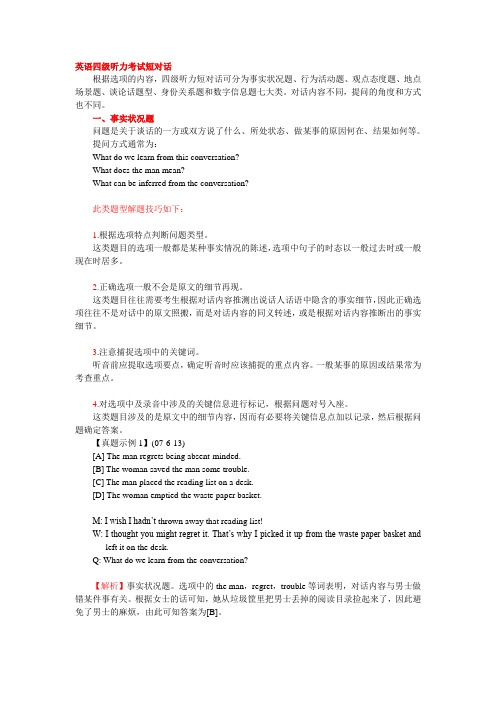
英语四级听力考试短对话根据选项的内容,四级听力短对话可分为事实状况题、行为活动题、观点态度题、地点场景题、谈论话题型、身份关系题和数字信息题七大类。
对话内容不同,提问的角度和方式也不同。
一、事实状况题问题是关于谈话的一方或双方说了什么、所处状态、做某事的原因何在、结果如何等。
提问方式通常为:What do we learn from this conversation?What does the man mean?What can be inferred from the conversation?此类题型解题技巧如下:1.根据选项特点判断问题类型。
这类题目的选项一般都是某种事实情况的陈述,选项中句子的时态以一般过去时或一般现在时居多。
2.正确选项一般不会是原文的细节再现。
这类题目往往需要考生根据对话内容推测出说话人话语中隐含的事实细节,因此正确选项往往不是对话中的原文照搬,而是对话内容的同义转述,或是根据对话内容推断出的事实细节。
3.注意捕捉选项中的关键词。
听音前应提取选项要点,确定听音时应该捕捉的重点内容。
一般某事的原因或结果常为考查重点。
4.对选项中及录音中涉及的关键信息进行标记,根据问题对号入座。
这类题目涉及的是原文中的细节内容,因而有必要将关键信息点加以记录,然后根据问题确定答案。
【真题示例1】(07-6-13)[A] The man regrets being absent-minded.[B] The woman saved the man some trouble.[C] The man placed the reading list on a desk.[D] The woman emptied the waste paper basket.M: I wish I hadn’t thrown away that reading list!W: I thought you might regret it. That’s why I picked it up from the waste paper basket and left it on the desk.Q: What do we learn from the conversation?【解析】事实状况题。
四级听力题目类型介绍

英语四级听力题目的类型包括:
1. 短对话:通常涉及两个人之间的对话,涵盖了日常生活、工作、学习等多个领域。
对话内容较为简单,一般围绕一个话题进行,问题也往往与对话内容密切相关。
2. 长对话:由两个或多个参与者展开的对话,对话内容较长,往往涉及多个话题和信息。
问题也比较复杂,不仅需要考生理解对话的内容,还需要考生分析对话中的细节和隐含意义。
3. 短文理解:一篇短文,长度约为 200 词左右,主要是介绍一些事实、故事、观点等。
问题通常需要考生理解文章的主要内容、细节和主题,并做出选择或判断。
4. 短文听写:要求考生在听完一篇短文后,写下文章的主要内容,包括文章中的细节、句子和单词。
这是四级听力中难度最高的一种题型,需要考生具备较高的听力理解和拼写能力。
5. 复合式听写:在复合式听写中,考生需要在听完一篇短文后,写下文章的主要内容,包括文章中的细节、句子和单词。
同时,考生还需要听懂一段话,然后根据所听到的内容回答问题。
这种题型不仅需要考生具备较高的听力理解和拼写能力,还需要考生具备较强的问题分析和解答能力。
以上是英语四级听力题目的主要类型,每种类型都有其独特的难度和特点,需要考生在平时的学习和练习中逐步提高自己的听力水平和答题能力。
2024年7月英语四级真题及参考答案完整版
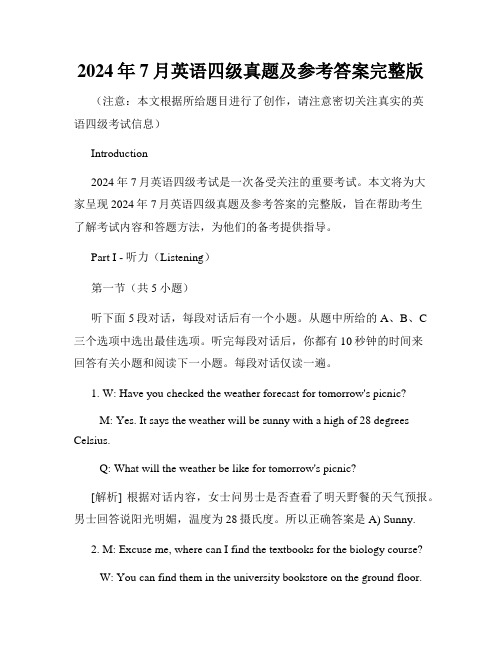
2024年7月英语四级真题及参考答案完整版(注意:本文根据所给题目进行了创作,请注意密切关注真实的英语四级考试信息)Introduction2024年7月英语四级考试是一次备受关注的重要考试。
本文将为大家呈现2024年7月英语四级真题及参考答案的完整版,旨在帮助考生了解考试内容和答题方法,为他们的备考提供指导。
Part I - 听力(Listening)第一节(共5小题)听下面5段对话,每段对话后有一个小题。
从题中所给的A、B、C 三个选项中选出最佳选项。
听完每段对话后,你都有10秒钟的时间来回答有关小题和阅读下一小题。
每段对话仅读一遍。
1. W: Have you checked the weather forecast for tomorrow's picnic?M: Yes. It says the weather will be sunny with a high of 28 degrees Celsius.Q: What will the weather be like for tomorrow's picnic?[解析] 根据对话内容,女士问男士是否查看了明天野餐的天气预报。
男士回答说阳光明媚,温度为28摄氏度。
所以正确答案是 A) Sunny.2. M: Excuse me, where can I find the textbooks for the biology course?W: You can find them in the university bookstore on the ground floor.Q: Where does the conversation most probably take place?[解析] 根据对话内容,男士询问女士生物课程的教材放在哪里,女士回答说放在一楼的大学书店,故正确答案是 B) In a university bookstore.3. W: The new mall is opening tomorrow. Would you like to go shopping there with me?M: I'd love to, but I have a meeting in the afternoon. How about this weekend?Q: What does the man mean?[解析] 女士邀请男士一起去新开的购物中心逛街,男士表示很想去但是有一个下午的会议,问女士这周末如何。
大学4级的考试题型及答案

大学4级的考试题型及答案大学英语四级考试(CET-4)是中国教育部主管的全国性英语水平考试之一,旨在评估中国大学生的英语听说读写能力。
以下是一份模拟的大学英语四级考试题型及答案示例:一、听力理解(共四大题,满分249分)第一部分:短对话理解(共8题,每题1分)1. A) At the library.B) At a bookstore.C) At a classroom.D) At a hotel.答案:B) At a bookstore.(类似题目7题,略)第二部分:长对话理解(共7题,每题2分)1. What is the man's major?A) Economics.B) Biology.C) Computer Science.D) History.答案:C) Computer Science.(类似题目6题,略)第三部分:短文理解(共10题,每题3分)1. What is the passage mainly about?A) The importance of sleep.B) The effects of sleep deprivation.C) The benefits of daytime napping.D) The relationship between sleep and dreams.答案:B) The effects of sleep deprivation.(类似题目9题,略)第四部分:复合式听写(共8题,每题3分)1. The lecture will be given in _______ (答案:Auditorium A). (类似题目7题,略)二、阅读理解(共20题,满分284分)第一部分:选词填空(共10题,每题3.5分)1. According to the passage, which of the following is NOT a reason for the decline in the number of bees?A) The use of pesticides.B) The loss of habitat.C) The impact of climate change.D) The introduction of foreign bees.答案:D) The introduction of foreign bees.(类似题目9题,略)第二部分:长篇阅读(共5题,每题7分)1. What is the main idea of the passage?A) The impact of technology on education.B) The challenges faced by modern students.C) The benefits of online learning.D) The role of traditional classroom teaching.答案:A) The impact of technology on education.(类似题目4题,略)第三部分:仔细阅读(共10题,每题14分)1. What does the author suggest is the best way to deal with the problem of procrastination?A) Setting small, achievable goals.B) Ignoring the problem and hoping it will go away.C) Punishing oneself for not being productive.D) Seeking help from a professional therapist.答案:A) Setting small, achievable goals.(类似题目9题,略)题目:Write an essay based on the following chart. You should:1. Describe the chart.2. Discuss possible reasons for the situation reflected by the chart.3. Suggest some solutions to the problem.范文:The chart illustrates the percentage of college graduates who have found employment within six months of graduation over a five-year period. It is noticeable that the employment rate has been declining steadily from 85% in Year 1 to 55% in Year 5.There could be several reasons for this trend. Firstly, the rapid growth in the number of graduates may have outpaced the job market's ability to absorb them. Secondly, a mismatch between the skills that graduates possess and those demanded by the market could be contributing to the problem. Lastly, economic downturns might also play a role in reducing job opportunities.To address this issue, universities should work closely with industries to align their curricula with market needs. Graduates should be encouraged to engage in continuous learning to enhance their employability. Additionally, the government could stimulate job creation through incentivesfor businesses and investment in key sectors.题目:将下面这段话翻译成英文。
【2024版】大学英语四级听力考试套题练习及原文解析
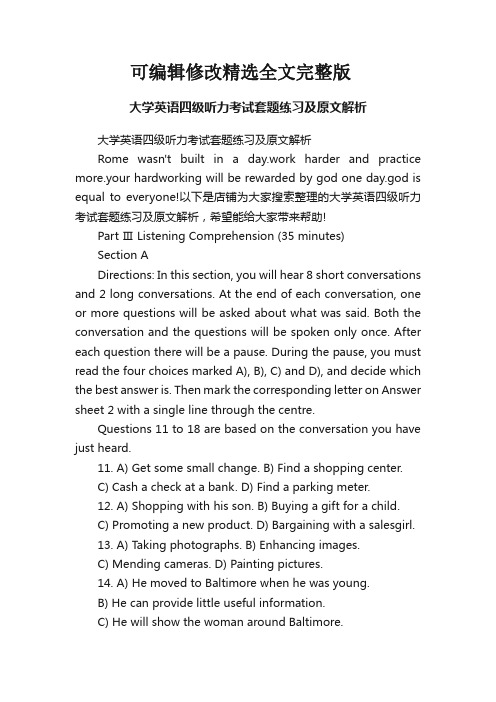
可编辑修改精选全文完整版大学英语四级听力考试套题练习及原文解析大学英语四级听力考试套题练习及原文解析Rome wasn't built in a day.work harder and practice more.your hardworking will be rewarded by god one day.god is equal to everyone!以下是店铺为大家搜索整理的大学英语四级听力考试套题练习及原文解析,希望能给大家带来帮助!Part Ⅲ Listening Comprehension (35 minutes)Section ADirections: In this section, you will hear 8 short conversations and 2 long conversations. At the end of each conversation, one or more questions will be asked about what was said. Both the conversation and the questions will be spoken only once. After each question there will be a pause. During the pause, you must read the four choices marked A), B), C) and D), and decide which the best answer is. Then mark the corresponding letter on Answer sheet 2 with a single line through the centre.Questions 11 to 18 are based on the conversation you have just heard.11. A) Get some small change. B) Find a shopping center.C) Cash a check at a bank. D) Find a parking meter.12. A) Shopping with his son. B) Buying a gift for a child.C) Promoting a new product. D) Bargaining with a salesgirl.13. A) Taking photographs. B) Enhancing images.C) Mending cameras. D) Painting pictures.14. A) He moved to Baltimore when he was young.B) He can provide little useful information.C) He will show the woman around Baltimore.D) He will ask someone else to help the woman.15. A) He is rather disappointed. B) He is highly ambitious.C) He can’t face up to the situation D) He knows his own limitation.16. A) She must have paid a lot B) She is known to havea terrific figure.C) Her gym exercise has yielded good results.D) Her effort to keep fit is really praiseworthy.17. A) Female students are unfit for studying physics.B) He can serve as the woman’s tutor.C) Physics is an important course at school.D) The professor’s suggestion is constructive.18. A) Indifferent. B) Doubtful. C) Pleased. D) Surprised.Questions 19 to 22 are based on the conversation you have just heard.19. A) He prefers the smaller evening classes. B) He has signed up for a day course.C) He has to work during the day. D) He finds the evening course cheaper.20. A) Learn a computer language. B) Learn data processing.C) Buy some computer software. D) Buy a few coursebooks.21. A) Thursday evening, from 7:00 to 9:45. B) From September 1 to New Year’s eve.C) Every Monday, lasting for 12 weeks. D) Three hours a week,45 hours in total.22. A) What to bring for registration. B) Where to attend the class.C) How he can get to Frost Hall. D) Whether he can use a check.Questions 23 to 25 are based on the conversation you havejust heard.23. A) A training coach. B) A trading adviser.C) A professional manager. D) A financial trader.24. A) He can save on living expenses. B) He considers cooking creative.C) He can enjoy healthier food. D) He thinks take-away is tasteless.25. A) It is something inevitable.B) It is frustrating sometimes.C) It takes patience to manage. D) It can be a good thing.Section BDirections: In this section, you will hear 3 short passages. At the end of each passage, you will hear some questions. Both the passage and the questions will be spoken only once. After you hear a question, you must choose the best answer from the four choices marked A), B), C) and D). Then mark the corresponding letter on Answer Sheet 2 with a single line through the centre.Passage OneQuestions 26 to 28 are based on the passage you have just heard.26. A) There were no planets without moons. B) There was no air or water on Jupiter.C) Life was not possible in outer space. D) The mystery of life could not be resolved.27. A) It has a number of active volcanoes. B) It has an atmosphere like the earth’s.C) It has a large ocean under its surface. D) It has deep caves several miles long.28. A) Light is not an essential element to it. B) Life can form in very hot temperatures.C) Every form of life undergoes evolution. D) Oxygen is not needed for some life forms.Passage TwoQuestions 29 to 31 are based on the passage you have just heard.29. A) Whether they should take the child home.B) What Dr. Mayer’s instructions exactly were.C) Who should take care of the child at home.D) When the child would completely recover.30. A) She encourages them to ask questions when in doubt.B) She makes them write down all her instructions.C) She has them act out what they are to do at home.D) She asks them to repeat what they are supposed to do.31. A) It lacks the stability of the printed word. B) It contains many grammatical errors.C) It is heavily dependent on the context. D) It facilitates interpePassage ThreeQuestions 33 to 35 are based on the passage you have just heard.32. A) Job security. B) Good labour relations.C) Challenging work. D) Attractive wages and benefits.33. A) Many tedious jobs continue to be done manually.B) More and more unskilled workers will lose jobs.C) Computers will change the nature of many jobs.D) Boring jobs will gradually be made enjoyable.34. A) Offer them chances of promotion.B) Improve their working conditions.C) Encourage them to compete with each other.D) Give them responsibilities as part of a team.35. A) They will not bring real benefits to the staff.B) They concern a small number of people only.C) They are arbitrarily set by the administrators.D) They are beyond the control of ordinary workers.Section CDirections: In this section, you will hear a passage three times. When the passage is read for the first time, you should listen carefully for its general idea. When the passage is read for the second time, you are required to fill in the blanks numbered from 36 to 43 with the exact words you have just heard. For blanks numbered from 44 to 46 you are required to fill in the missing information. For these blanks, you can either use the exact words you have just heard or write down the main points in your own words. Finally, when the passage is read for the third time, you should check what you have written.注意:此部分试题在答题卡2上。
大学英语四级听力四大题型全解析
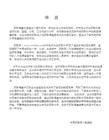
Man: You look terrific! It seems that your effort has paid off。
Question: What does the man imply about the woman?
解析:可以明显看出,本题的答案为C(她的健身房联系获得了好的结果)。yielded good results和原文中的your effort has paid off产生了替换作用。其中,类似gym和terrific、efforts等这样明显的词汇是特别需要慎选的,因为这些词汇都在原文中被明显播读过。另外本题目中还包括很多有用的说法:例如terrific figure (魔鬼身材)paid off(发生效果),以及重复考过的out of shape (身材走样) 等等。
Q: What do we learn about the man from the conversation?
以上三道小对话,都把问题的设计方向安排在第二句的位置上。所以,考生在解题时需要将自己的听力重点放在第二句上。
第二部分:长对话
做题方式:视听基本一致原则,场景解题原则
20. What does the man have to do before taking the course of computer programming?
特别需要指出的是,本题发生的主题场景就在大学——Parkson College,学生向老师咨询课程(courses)的内容。这时,做完题目的考生得问问自己:选修课必修课,大课小课,讲座展示,学分学时这类词汇和短语我们都会说么?(具体内容请特别关注本期七大听力高频词汇)
32. A) The atmosphere they live in is rather unreal。
(英语四级经验)大学英语四级考试题型分析
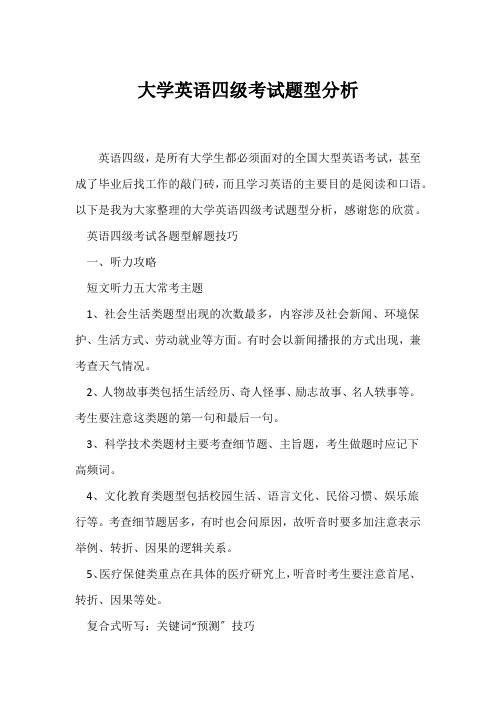
大学英语四级考试题型分析英语四级,是所有大学生都必须面对的全国大型英语考试,甚至成了毕业后找工作的敲门砖,而且学习英语的主要目的是阅读和口语。
以下是我为大家整理的大学英语四级考试题型分析,感谢您的欣赏。
英语四级考试各题型解题技巧一、听力攻略短文听力五大常考主题1、社会生活类题型出现的次数最多,内容涉及社会新闻、环境保护、生活方式、劳动就业等方面。
有时会以新闻播报的方式出现,兼考查天气情况。
2、人物故事类包括生活经历、奇人怪事、励志故事、名人轶事等。
考生要注意这类题的第一句和最后一句。
3、科学技术类题材主要考查细节题、主旨题,考生做题时应记下高频词。
4、文化教育类题型包括校园生活、语言文化、民俗习惯、娱乐旅行等。
考查细节题居多,有时也会问原因,故听音时要多加注意表示举例、转折、因果的逻辑关系。
5、医疗保健类重点在具体的医疗研究上,听音时考生要注意首尾、转折、因果等处。
复合式听写:关键词“预测〞技巧技巧一:根据空白处的语法形式预测答案在复合式听写中,填单词采用的是完形填空的形式,每个空格都处于特定的上下文之中。
因此,考生可以根据空格在句中的位置判断所填单词的词性。
由历年真题来看,六级听写的单词局部名词和动词占所需填写单词中的5-6个,副词和形容词一般在1-3个,短语占到2-3个。
技巧二:根据并列连词或并列关系预测答案在预读听写短文时,考生常常会看到but,and,as well as这类并列连词。
这些标志性的连词可以暗示所填词的词性及意思。
技巧三:根据固定搭配预测答案英语的表达中有许多固定搭配,出题人有时会在固定搭配的短语上挖空,考生平时要多积累常用的固定表达,以不变应万变。
二、阅读攻略长篇阅读做题技巧:1. 快速阅读文章标题、首尾两段,了解主题;2. 通读10道题目,划出关键词;3. 带着关键词浏览文章,寻找与所划关键词一致或同义的词句。
阅读常考题型详解1、细节题例:55. What is the chief concern of native high-skilled,better-educated employees about the inflow of immigrants(CET-6, 2021.6)原文出处:Among high-skilled,better-educated employees, however, opposition was strongest in states with both high numbers of immigrants and relatively generous social services.题干中的high-skilled,better-educated employees的信息非常具体,和原文一致。
专四听力题型分析
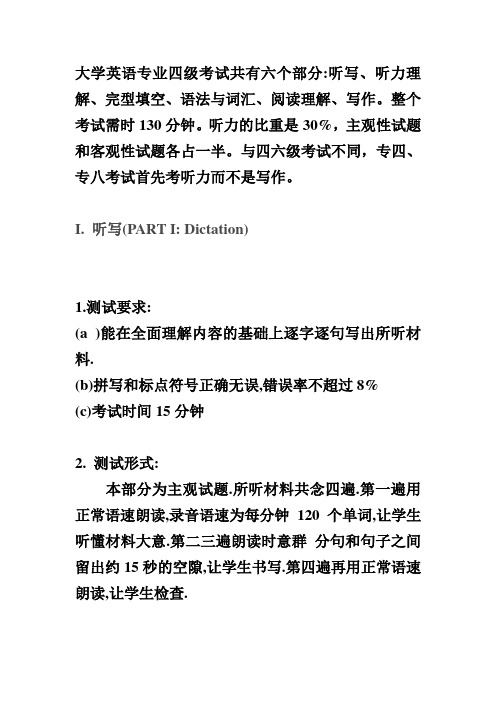
大学英语专业四级考试共有六个部分:听写、听力理解、完型填空、语法与词汇、阅读理解、写作。
整个考试需时130分钟。
听力的比重是30%,主观性试题和客观性试题各占一半。
与四六级考试不同,专四、专八考试首先考听力而不是写作。
I. 听写(PART I: Dictation)1.测试要求:(a )能在全面理解内容的基础上逐字逐句写出所听材料.(b)拼写和标点符号正确无误,错误率不超过8%(c)考试时间15分钟2. 测试形式:本部分为主观试题.所听材料共念四遍.第一遍用正常语速朗读,录音语速为每分钟120个单词,让学生听懂材料大意.第二三遍朗读时意群分句和句子之间留出约15秒的空隙,让学生书写.第四遍再用正常语速朗读,让学生检查.3. 测试目的:测试学生听力理解能力拼写熟练程度以及正确运用标点符号的能力.4. 选材原则:(a )题材广泛体裁多样.(b)听写材料难度以不超过<<大纲>>规定为准.(c) 听写材料长度约150个单词II 听力理解(Part II : Listening Comprehension)1. 测试要求:(a )能听懂英语国家人士关于日常生活和社会生活的谈话,以及中等难度(如TOEFL中的短文)的听力材料.能理解大意,领会说话者的态度感情和真实意图. (b)能听懂相当于VOA正常语速和BBC新闻节目的主要内容(c)能辨别各种英语变体(如美国英语英国英语澳大利亚英语等)(d)考试时间约15分钟2.测试形式:本部分采用多项选择题,分三节:Section A, Section B, Section C,共30题.Section A: Conversations本部分含有若干组对话,每组约为200个单词.每组对话后有若干道题.本部分共有10题.Section B: Passages本部分含有若干篇短文,每篇长度约为200个单词.每篇后有若干道题.本部分共有10题Section C: News Broadcast本部分含有若干段VOA或BBC新闻,每段新闻后有若干道题.本部分共有10题..本部分后有5秒的间隙,要求学生从所给的四个选项中选出一个最佳答案.录音语速为每分钟约120个单词,念一遍.3.测试目的:测试学生获得口头信息的能力.4.选材原则:(a )对话和短文中的部分内容与日常生活和学习活动相关.(b)VOA和BBC新闻材料为学生所熟悉的一般新闻报道短评或讲话等.(c) 听写材料中所出现的词语原则上不超出<<>大纲>规定的范围.英语专业四级听力部分常考题型及技巧听力理解--对话对话的常考题型1.主旨要义题:问对话讨论的是什么。
大学英语四级听力都有哪些题型
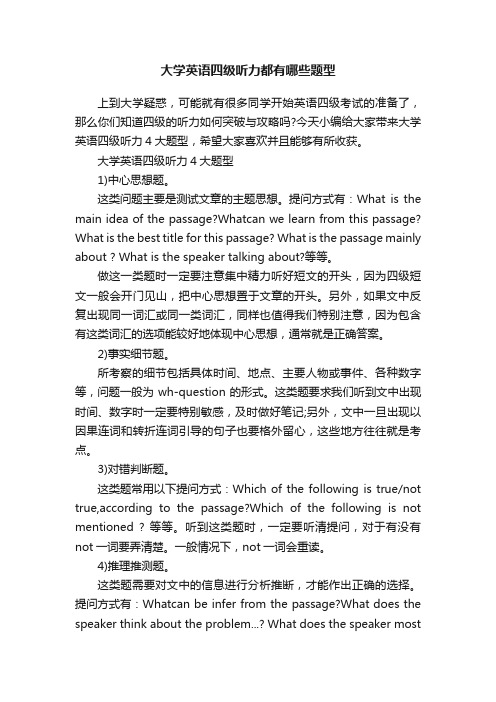
大学英语四级听力都有哪些题型上到大学疑惑,可能就有很多同学开始英语四级考试的准备了,那么你们知道四级的听力如何突破与攻略吗?今天小编给大家带来大学英语四级听力4大题型,希望大家喜欢并且能够有所收获。
大学英语四级听力4大题型1)中心思想题。
这类问题主要是测试文章的主题思想。
提问方式有:What is the main idea of the passage?Whatcan we learn from this passage? What is the best title for this passage? What is the passage mainly about ? What is the speaker talking about?等等。
做这一类题时一定要注意集中精力听好短文的开头,因为四级短文一般会开门见山,把中心思想置于文章的开头。
另外,如果文中反复出现同一词汇或同一类词汇,同样也值得我们特别注意,因为包含有这类词汇的选项能较好地体现中心思想,通常就是正确答案。
2)事实细节题。
所考察的细节包括具体时间、地点、主要人物或事件、各种数字等,问题一般为wh-question的形式。
这类题要求我们听到文中出现时间、数字时一定要特别敏感,及时做好笔记;另外,文中一旦出现以因果连词和转折连词引导的句子也要格外留心,这些地方往往就是考点。
3)对错判断题。
这类题常用以下提问方式:Which of the following is true/not true,according to the passage?Which of the following is not mentioned ? 等等。
听到这类题时,一定要听清提问,对于有没有not一词要弄清楚。
一般情况下,not一词会重读。
4)推理推测题。
这类题需要对文中的信息进行分析推断,才能作出正确的选择。
提问方式有:Whatcan be infer from the passage?What does the speaker think about the problem...? What does the speaker mostconcerned about? How does the writer feel about...?等等。
四级听力题型详解

四级听力题型详解在四级考试的听力部分,有多种不同的题型出现。
掌握每种题型的特点和解题技巧是提高听力成绩的关键。
本文将详细解析四级听力题型,并提供针对性的解题建议。
1. 听力题型一:听力选择题听力选择题是四级听力中最常见的题型之一。
在这种题型中,你需要从A、B、C三个选项中选择正确的答案。
通常,选择题的问题是基于对听力材料的综合理解。
解题建议:- 在听录音前,先阅读问题,了解问题的要求和关键信息。
- 听录音时,注意关注问题中的关键词和信息。
- 听完录音后,再听一遍,同时比较每个选项,找出与听力内容相关的信息。
- 选择最符合听力内容的选项作为答案。
2. 听力题型二:听力填空题听力填空题要求你在听力材料中找到缺失的关键信息,然后填写到答题卡对应的空格中。
这种题型要求你快速捕捉关键词,并理解其在句子中的含义。
解题建议:- 在听录音前,快速阅读题目,了解空格的位置和要填入的词汇类型。
- 听录音时,注意关注关键词,以及词汇的词性、形式变化等细节。
- 根据听到的内容,在相应的空格中填入正确的词汇。
3. 听力题型三:听力判断题听力判断题要求你根据听到的信息判断陈述的正误。
一般来说,听力判断题的选项为“True”(正确)、“False”(错误)或“Not mentioned”(未提及)。
解题建议:- 在听录音前,阅读题目,并了解陈述的内容和要求。
- 听录音时,注意关注陈述的关键词和信息。
- 根据听到的内容,判断陈述的正误,并选择相应的选项。
4. 听力题型四:听力匹配题听力匹配题要求你根据听到的对话或独白内容,将问题与选项进行匹配。
通常,听力材料会提供一组与之相关的选项。
解题建议:- 在听录音前,先阅读匹配选项,理解每个选项的含义和特点。
- 听录音时,关注对话中涉及到的信息,以及每个选项的特征。
- 根据听到的内容,将问题与最匹配的选项进行配对。
5. 听力题型五:听力排序题听力排序题要求你根据听到的对话或独白内容,将信息按照发生的顺序进行排序。
四级题型介绍解释

四级题型介绍解释四级题型介绍及参考内容:四级考试是大学英语四六级考试中的一项,主要测试考生的听力、阅读、写作和翻译能力。
四级考试题型涵盖了多种形式,以下将对其中常见的题型进行介绍,并提供相关的参考内容。
一、听力题型:1. 听力短对话理解题:根据听到的对话内容选择正确的答案。
参考内容:A: Excuse me, could you tell me where the nearest post office is? B: Sure. Go straight ahead and turn left at the second traffic light. You will see the post office on your right.Question: Where is the post office?(A) On the left of the traffic light.(B) On the right of the traffic light.(C) On the right of the speaker.(D) On the left of the speaker.2. 听力长对话理解题:根据听到的对话内容回答相关问题。
参考内容:A: Have you decided on a major yet?B: Not yet. I'm still considering my options.A: Well, have you thought about studying economics?B: I have, but I'm not sure if it's the right fit for me.Question: What does the woman say about studying economics?(A) She's not sure about it.(B) She's considering it.(C) She's decided on it.(D) She's not interested in it.二、阅读题型:1. 阅读理解题:阅读短文,回答相关问题,考查考生的阅读理解和推理能力。
英语四级听力有哪些题型
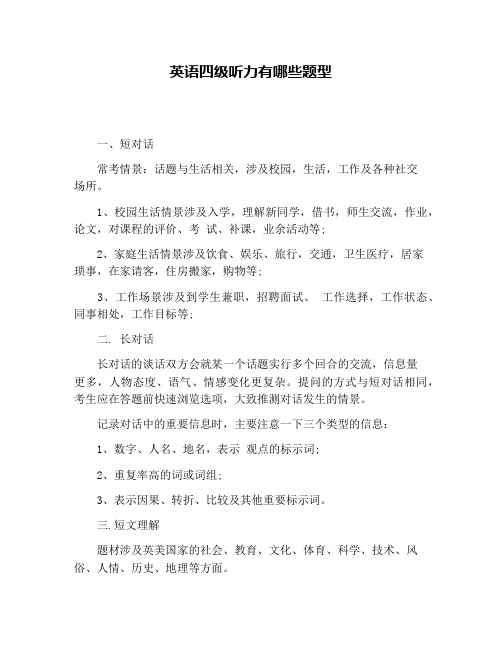
英语四级听力有哪些题型一、短对话常考情景:话题与生活相关,涉及校园,生活,工作及各种社交场所。
1、校园生活情景涉及入学,理解新同学,借书,师生交流,作业,论文,对课程的评价、考试、补课,业余活动等;2、家庭生活情景涉及饮食、娱乐、旅行,交通,卫生医疗,居家琐事,在家请客,住房搬家,购物等;3、工作场景涉及到学生兼职,招聘面试、工作选择,工作状态、同事相处,工作目标等;二. 长对话长对话的谈话双方会就某一个话题实行多个回合的交流,信息量更多,人物态度、语气、情感变化更复杂。
提问的方式与短对话相同,考生应在答题前快速浏览选项,大致推测对话发生的情景。
记录对话中的重要信息时,主要注意一下三个类型的信息:1、数字、人名、地名,表示观点的标示词;2、重复率高的词或词组;3、表示因果、转折、比较及其他重要标示词。
三.短文理解题材涉及英美国家的社会、教育、文化、体育、科学、技术、风俗、人情、历史、地理等方面。
常考题型有三种:1、主旨大意题:要重视首尾句、同时要重视短文多次提到的某些词语或内容。
2、事实细节题:短文中的主要人物、人名、时间、主要时间、数据、原因等细节需做笔记,另外:注重标示逻辑关系的句子如转折、因果、条件等。
此外,列举处,短文强调的内容等通常也是重点。
3、推理判断题:需要对短文的主旨和细节有较深层次的理解,注意与主题密切相关的选项注意短文中的关联词。
四.复合式听写:1、单词部分主要考查名词、动词、形容词,偶尔也会有副词。
名词要特别注意单复数形式。
和一些以-ure,-ty,-ment,-ity名词的后缀;动词主要考单复数形式、时态、语态以及某些动词的特变化。
要特别注意弱读喔,连读尤其是读音相近的词(如row和rule),甚至是同音词,填在空格处的词一定要符合上下文的语义。
利用读指令的这段时间,大致浏览一遍短文,了解一下全文语意意群的内容,通过阅读,对于所有要听的文字材料在头脑中形成一个大概印象,并对要填写的文字实行初步猜测。
开篇加短对话

Iris
1. 推理原则:一般需对对话进行推理,故直接在对话中听到的一般 不是正确答案。
2. 挫折原则:通常要办的事情都是不顺利的(如买东西买不到,订 房间客满等)
3. 男女原则:一般男生比较衰,女生比较牛。男生提出的观点女生 都是不同意或有不同看法的,反之女生提出的观点男生都是同意和赞 赏的。
男生的特征:脏、乱、差、浪费、穷、小气、不良习惯、迟钝、不顾 家 女生的特征:爱干净、节约、富有、好学、能干、聪明、大度、耐心、 恋家、除数理化外成绩都很好
4. 四个选项中,仅有一个或者两个选项含有听力中很少涉及的词
Iris
汇,则该选项一般不对 A) He was kept in hospital for a long time. B) He was slightly injured in a traffic accident. C) He was seriously wounded in a mine explosion. D) He was fined for speeding.
四. 天气场景
多云:
cloudy;
阴天:
overcast;
阵雨:
shower;
Iris
Iris
倾盆大雨:downpour/pouring;
英语四级试卷结构、考试形式及听力结构分析

英语四级试卷结构、考试形式及听力结构分析--Super English--本文档不仅介绍了英语四级考试的结构,还说明了一些考试中要注意的问题。
后面还主要谈了听力方面的问题,列举出很多话题、场景以及听力常考短语。
共大家积累与学习。
试卷结构:总分710分。
听力部分(35%)满分为249分;阅读部分(35%)满分为249分;综合部分(10%)满分为70分;作文部分(15%)满分为106分,翻译部分(5%)满分为36分。
单项部分如没有作答或全部答错,该部分成绩计为0分一、试卷构成就所测试的语言能力而言,试点阶段的四级考试由以下四个部分构成:1)听力理解;2)阅读理解;3)完型填空或改错;4)写作和翻译。
听力理解部分分值比例为35%;其中听力对话15%,听力短文20%。
听力对话部分包括短对话和长对话的听力理解;听力短文部分包括选择题型的短文理解和复合式听写。
阅读理解部分分值比例为35%;其中仔细阅读部(Reading in Depth)25%,快速阅读部分(Skimming and Scanning)10%。
仔细阅读部分分为:a)选择题型的篇章阅读理解;b)篇章层次的词汇理解(Banked Cloze)或短句问答(Short Answer Questions)。
快速阅读理解部分测试的是浏览阅读和查读能力。
完型填空或改错部分分值比例为10%。
完型填空部分采用多项选择题型,改错部分的要求是辨认错误并改正。
写作和翻译部分分值比例为20%;其中写作部分(Writing)15%,翻译部分(Translation)5%。
写作的体裁包括议论文、说明文、应用文等;翻译部分测试的是句子、短语或常用表达层次上的中译英能力。
具体比例搭配如下:作文15%(有14分、12分、8分、6分、2分和0分四个档次,用时30分钟)快速阅读10%(7个判断题每个1%,3个填空题也是1%,单词拼写错误不给分,用时15分钟)听力35%(短对话8个,每个1%,长对话8个,每个1%,短文10个,每个1%,填词7个,每个0.5%,3个句子分别为2%,2%,2.5%。
CET4短文听力解读

提问方式有: What can/cannot be inferred from the passage? What does the passage mainly suggest? What does it imply? What can be inferred from the passage? …
细节题考的最多,10道中有7至8道都是细节题。最典型的 就是05年6月四级三篇文章10道通通是细节题( 例5)
解题步骤 1. 审题。听前阅读选项,增加听的目的性和针对性。 2. 文章的主题一般出现在文章的首句,在听时一定要注意首 句的理解。注意把握首尾句,从整体上理解全文,这同样 有利于主题题的解答。 3. 听时记笔记,以掌握文章的主要细节内容。边听文章边 看选项,按照听到的顺序给选项标号。
五. 社会热门话题类
社会热门话题类短文是作者就某一社会问题,如社会政 治、经济问题、家庭问题(离婚、妇女地位、青少年问 题等)犯罪问题、环境问题、交通问题等引述各种观点, 或进行分析并旗帜鲜明地表达自己的观点和立场的文章。
社会热门话题类多为表达自己观点型的短文,其题目多 为主观题,应按照作者观点来判断回答,不能依据自己 的主观看法或常识进行臆断。
主旨题应对策略
做这一类题时一定要注意集中精力听好短 文的开头,因为四级听力短文一般会开门 见山,把中心思想置于文章的开头。另外, 如果文中反复出现同一词汇或同一类词汇, 同样也值得我们特别注意,因为包含有这 类词汇的选项能较好地体现中心思想,通 常就是正确答案。
主旨题应对策略
一、留意首尾处 1. 主题句在开头 (例1) 2. 主题句在结尾 (例2) 二、根据各题选项推测主题 (例3) 三、留意重复频率高的词或短语(例4)
大学英语四级新闻听力详细讲解.ppt

四大设题处
1.新闻的首句。新闻命题点常常是新闻报道中所说到的6 要素即(what, who, which, where, when, how),其中 又有50%位于导语部分即第一句话,所以每个新闻的第 一句话非常重要。
2. 新闻的尾句 。尾句有时是对新闻做总结或概述,所以 设题点也可能在新闻的尾句。
.
3.扩大词汇量。
4.掌握一些基本缩略语。
5.注意数字的不同说法。
6.循序渐进,由易到难。
7.要密切注意国内外形势的变化。
积累新闻高频词汇
• adverse trade balance 逆差 • advisory body 顾问团 • allied powers 同盟国 • all-out ban 全面禁止 • alumnus (复数: alumni) 校友 • amendment 修正案,附加条款 • amnesty 特赦 • anarchy 无政府状态 • anti-corruption 反腐败 • apartheid 种族隔离 • appropriate authorities 有关当局 • arch-foe 主要的劲敌 armed intervention 武装干涉 • arm-twisting 施加压力 • arson 放火,纵火 • assistant secretary (美)助理部长
两国或多国关系(International Relations)
国家领导人的政策性讲话,关系到国家关系处理上 原则、立场、态度、愿望、条件等 语言较文采,理解有难度
处理国家关系中的具体活动报道 进展如何、有何波折等 语言平易,较好理解
军事纠纷(Fighting)
时间、地点、武器名称、参战实力、战斗经过、人 员伤亡、装备损失等 注意新闻来源(各新闻社在报道新闻时会有观点倾 向性。)
2023年12月大学英语四级听力真题附原文及答案解析

12月大学英语四级听力真题PartⅡListening Comprehension(30 minutes)Section ADirections: In this section, you will hear 8 short conversations and 2 long conversations. At the end of each conversation, one or more questions will be asked about what was said. Both the conversation and the questions will be spoken only once. After each question there will be a pause. During the pause, you must read the four choices marked A), B), C) and D), and decide which is the best answer. Then mark the corresponding letter on Answer Sheet 1 with a single line through the centre.1. A) The woman is now working in a kindergarten.B) The man will soon start a business of his own.C) The man would like to be a high school teacher.D) The woman is going to major in child education.2. A) The furniture has to be rearranged.B) The sound equipment has to be set up.C) The conference room has to be cleaned.D) The video machine has to be checked.3. A) She is exhausted.B) She is near-sighted.C) She cannot finish work in time.D) She cannot go straight home.4. A) The woman is too particular about food.B) He would rather have a meal an hour later.C) The woman should order her food quickly.D) He usually prefers ice-cream to sandwiches.5. A) He is not a good mechanic.B) He doesn't keep his promises.C) He spends his spare time doing repairs.D) He is always ready to offer help to others.6. A) Sam has a big family to support.B) Sam is not interested in traveling.C) The pay offered by the travel agency is too low.D) The work hours in the travel agency arc too long7. A) International trade.B) Product development.C) Financial consulting.D) Domestic retailing.8. A) Go on a business trip.B) Look for a job in Miami.C) Make a ticket reservation.D) Take a vacation.Questions 9 to 11 are based on the conversation you have just heard.9. A) It is located on Route 18.B) It has an interesting museum.C) It is a beautiful little town.D) It lies seven miles east of Newton.10. A) They are in opposite directions.B) They are fifty-five miles apart.C) They are quite close to each other.D) They are a long drive from Norwalk.11. A) They are connected by RouteB) They are crowded with tourists.C) They have lots of old houses.D) They have many rare plants.Questions 12 to 15 are based on the conversation you havejust heard.12. A) Bring him up to date on the current situation in Milan.B) Inform him of the arrangements for his trip in Italy.C) Fetch the documents signed by Mr. Gartner.D) Accompany Mr. Gartner to the Linate airport.13. A) About 8:30. B) About 6:30. C) About 5:30. D) About 4:15.14. A) Mr. Gartner from Milan.B) Gianni Riva at Megastar.C) The company's sales representative.D) Gavin from the Chamber of Commerce.15. A) Travel agent. B) Business manager. C) Secretary.D) Saleswoman.Section BDirections: In this section, you will hear 3 short passages. At the end of each passage, you will hear some questions. Both the passage and the questions will be spoken only once. After you hear a question, you must choose the best answer from the four choices marked A), B), C) and D). Then markthe corresponding letter on Answer Sheet 1 with a single line through the centre.Passage OneQuestions 16 to 19 are based on the conversation you have just heard.16. A) She had a desire to help others.B) She wanted to find out more about it.C) She needed some overseas experience.D) She was interested in farming.17. A) Carry out a cultural exchange program.B) Work on an agricultural project.C) Learn Portuguese.D) Teach English.18. A) She found it difficult to secure a job in her own country.B) She wanted to renew her contact with the Peace Corps.C) She was invited to work as an English teacher.D) She could not get the country out of her mind.19. A) By teaching additional English classes.B) By writing stories for American newspapers.C) By working part time for the Peace Corps.D) By doing odd jobs for local institutions.Passage TwoQuestions 20 to 22 are based on the passage you have just heard.20. A) Time spent exercising.B) Time spent working.C) Time spent on leisure activities.D) Time spent with friends and family.21. A) Reading. B) Surfing the Web. C) Eating out.D) Watching TV.22. A) Driving. B) Gardening. C) Going to the pub.D) Visiting friends.Passage ThreeQuestions 23 to 25 are based on the passage you have just heard.23. A) The car driver was trying to avoid hitting a rabbit.B) The car driver was partly responsible for the accident.C) McLaughlin was talking to his manager while driving.D) McLaughlin's carelessness resulted in the collision.24. A) He crashed into a car parked there.B) He knocked down several mailboxes.C) He tore down the company's main gate.D) He did serious damage to a loaded truck.25. A) He will lose his job.B) He will have to pay damages.C) He will be fined heavily.D) He will receive retraining.Section CDirections: In this section, you will hear a passage three times. When the passage is read for the first time, you should listen carefully for its general idea. When the passage is read for the second time, you are required to fill in the blanks with the exact words you have just heard. Finally, when the passage is read for the third time, you should check what you have written.When Captain Cook asked the chiefs in Tahiti why they always ate __26__, they replied. "Because it is right." If we askAmericans why they eat with knives and forks, or why their men wear pants __27__ skirts, or why they may be married to only one person at a time, we are likely to get __28__ and very uninformative answers: "Because it's right. " "Because that's the way it's done." "Because it's the __29__. " Or even "I don't know. " The reason for these and countless other patterns of social behavior is that they are __30__ by social norms-shared rules or guidelines which prescribe the behavior that is appropriate in a given situation. Norms __31__ how people "ought" to behave under particular circumstances in a particular society. We conform(遵守) to norms so readily that we are hardly aware they __32__. In fact, we are much more likely to notice __33__ from norms than conformity to them. You would not be surprised if a stranger tried to shake hands when you were introduced, but you might be a little __34__ if they bowed, started to stroke you, or kissed you on both __35__ Yet each of these other forms of greeting is appropriate in other parts of the world. When we visit another society whose norms are different, we quickly become aware that things we do this way, they do that way.听力文本及答案Question 1M: After high school, I’d like to go to college and major in business administration.W: But I’d rather spend my college days finding out how children learn.Q: What do we learn from the conversation?Question 2W: Is everything ready for the conference?M: The only thing left to do is set up the microphones and speakers. They'll be here in a few minutes.Q: What preparations have yet to be made?Question 3W: Is it almost time to go home now? I'm so tired. I can hardly see straight.M: Just a few more minutes, then we can go.Q: What is the woman’s problem?Question 4W: I'm not sure what I’m in a mo od for. Ice-cream or sandwiches? They are both really good here.M: The movie starts in an hour. And we still have to get there and park. So just make a decision.Q: What does the man mean?Question 5W: Tom said he would come to repair our solar heater when he has time.M: He often says he is willing to help, but he never seems to have time.Q: What does the man imply about Tom?Question 6W: So you know that Sam turns down the job offered by the travel agency.M: Yes. The hours were convenient. But if he had accepted it, he wouldn’t be able to make ends meet.Q: What do we learn from the conversation?Question 7M: Could you tell me a bit about the business your company is doing?W: We mainly deal with large volume buyers from western countries and our products have been well received.Q: What business is the woman’s company doing? Question 8W: Yesterday I made reservations for my trip to Miami next month.M: You must really be looking forward to it. You haven’t had any time off for at least two years.Q: What is the woman going to do?【答案】1.D The woman is going to major in child education.2.B The sound equipment has to be set up.3.A She is exhausted.4.C The woman should order her food quickly.5. B He doesn’t keep his promises.6.C The pay offer by the travel agency is too low.7.A International trade.8.D Take a vacation.【点评】本次四级短对话无论从对话内容还是从题目自身来看,整体难度相对简朴,和往年该部分相类似,话题覆盖平常生活(生活琐事、看电影、旅游等)、校园生活、商务工作(会议、求职等)。
- 1、下载文档前请自行甄别文档内容的完整性,平台不提供额外的编辑、内容补充、找答案等附加服务。
- 2、"仅部分预览"的文档,不可在线预览部分如存在完整性等问题,可反馈申请退款(可完整预览的文档不适用该条件!)。
- 3、如文档侵犯您的权益,请联系客服反馈,我们会尽快为您处理(人工客服工作时间:9:00-18:30)。
四级听力四大题型全解析四级听力题目构成与比例小对话: 8% 选择题共8道对话,每题长约1分钟长对话: 7% 选择题共2段对话,每段长约3分钟听力短文: 10% 选择题共3篇文章,每篇长约3分钟复合式听写:10% 听写填空填8个单词和三句话,放音三遍,共计8分钟听力位于考试的卷二部分,共占全卷35%。
第一部分:小对话做题方式:视听反向原则、同义替换原则,第二句话易为考点。
例题:2009年12月四级考试第9题A) She must have paid a lot for the gym.B) She is known to have a terrific figure.C) Her gym exercise has yielded goodresults.D) Her effort to keep fit is reallypraiseworthy.Woman: I’ve been working out the gym since January. I was a bit out of shape.Man: You look terrific! It seems that your effort has paid off.Question: What does the man imply about the woman?解析:可以明显看出,本题的答案为C(她的健身房联系获得了好的结果)。
yielded good results和原文中的your effort has paid off产生了替换作用。
其中,类似gym和terrific、efforts等这样明显的词汇是特别需要慎选的,因为这些词汇都在原文中被明显播读过。
另外本题目中还包括很多有用的说法:例如terrific figure(魔鬼身材)paid off(发生效果),以及重复考过的out of shape (身材走样)等等。
例题:请关注2009年6月几道小对话题目的原文形式和设问方式:W: There were more than a hundred people at Kate's birthday party. How come she's got so many friends?M: It's really no surprise. You know she was popular even when she was a child.Q: What does the man imply about Kate?M: My washing machine is more than fifteen years old and it has worked just fine until last night。
W: You'll never be able to get parts for it, even from Japan. So it might be time to invest a more recent model。
Q: What does the woman suggest the man do?W: I heard about your promotion, you must be thrilled。
M: Not really, the new office is huge, but the word load has doubled。
Q: What do we learn about the man from the conversation?以上三道小对话,都把问题的设计方向安排在第二句的位置上。
所以,考生在解题时需要将自己的听力重点放在第二句上。
第二部分:长对话做题方式:视听基本一致原则,场景解题原则视听基本一致的含义是指,听到的原文和看到的选项若基本一致,则选项容易为正确选择。
这一点和短对话的原则恰恰相反,请考生一定注意。
另外,考生还应注意长对话第一回合句,转折关系以及语调变化等。
例题:2009年12月四级考试第1篇长对话(部分节选):Questions 19 to 22 are based on the conversation you have just heard.19. A) He prefers the smaller eveningclassesC) He has to work during the day.B) He has signed up for a daycourse.D) He finds the evening course cheaper.20. A) Learn a computer language.B)Learn data processingC) Buy some computer software.D) Buy a few coursebooks.答案:C B听力原文(部分节选):Woman: Hello, Parkson College. May I help you? Man: Yes. I’m looking for informationon courses in computer programming. I would need it for the fourth semester.W: Do you want a day or evening course?M: Well, it would have to be an evening course since I work during the day(19题答案点在此处直接被读出).W: Aha. Have you taken any courses indata processing?M: No.W: Oh. Well, data processing is acourse you have to take(20题答案点在此处被读到) before you can take computer programming….19. Why does the man choose to take an evening course?20. What does the man have to do before taking the course of computer programming?特别需要指出的是,本题发生的主题场景就在大学——Parkson College,学生向老师咨询课程(courses)的内容。
这时,做完题目的考生得问问自己:选修课必修课,大课小课,讲座展示,学分学时这类词汇和短语我们都会说么?第三部分:短文听力短文听力一般篇幅比较长,而且问题又出现在整个材料读完之后,所以对很多考生来说,如果完全听完材料,再听问题最后选择的话,就很容易忘记刚刚在材料中所听到的内容,尤其是当考察一些细节题目的时侯。
针对这一情况,我们提供如下四种方法,在听材料的同时选出答案来。
分别是:首尾法、视听一致原则、替换法、短词题解题法。
1、首尾法:根据统计,一篇听力材料,比较容易出题的地方是这篇材料的前几句和后几句。
而且分别针对的是这篇材料所对应题目的第一道和最后一道。
因此,对于“慢热型(听过几句话之后,才能集中起注意力来,但这时很可能第一道题目的正确答案已经被读过)”的同学来说,从材料的第一句话就要开始注意听了。
一旦错过了正确答案针对的那句话,就可能没有机会选出正确选项了。
下面举一个典型的例子:以2009年6月的四级考试第三篇短文听力为例,、Q32: Why is life said to be difficult for Hollywood kids?Q35: What will probably have negative effects on the lives of Hollywood kids?32. A) The atmosphere they live in is rather unreal.B) Their parents put too much pressure on them.C) It’s hard for them to get along with other kids.D) They have to live in the shadow of their parents.35. A) The lifestyle depicted in Hollywood movies.B) The worship of money, beauty and pleasure.C) The attention the media focuses on them.D) The pursuing of perfection in performance.In Hollywood, everybody wants to be rich, famous and beautiful. Nobody wants to be old, unknown and poor. For Hollywood kids, life can be difficult, because they grow up in such an unreal atmosphere. Their parents are ambitious and the children are part of the pa rents’ ambitions. (首段)…Hollywood has always been the city of dreams. The kids there live unreal lives where money, beauty and pleasure are the only gods. Will children around the world soon start to think the same? Or do they already? (末段)根据首段和末段的内容,我们很容易分析出,32题的答案是A,35题的答案是B。
2、同义替换法:如上题,在长对话和短文听力这两种题型中,约有30%的题目采用了替换法,采用同义的短语或单词替换。
我们依旧以历年真题中的比较典型的一篇短文听力为例,这篇短文听力共有相对应的四道题目,都可以用我们的替换法解答。
14. A) He didn’t like physics any more. B) His eyesight was too poor.C) Physics was too hard for him. D) He had to work to support himself.(D)15. A) He was not happy with the new director.B) He was not qualified to be an engineer.C) He wanted to travel.D) He found his job boring.(A)16. A) He wanted to work with his friend.B) He enjoyed traveling around the world.C) He wanted to go to Spain.D) He was rejected by the engineering firm.(C)17. A) He enjoyed teaching English.B) He wanted to earn more to support his family.C) The owner of the school promised him a good position.D) He could earn more as a teacher than as a travel agent.(B)听力原文(部分)及问题如下When I was at school, my ambition was to be a pilot in the Air Force. But my eyesight wasn't good enough. So I had to give up the idea.I went to university and studies physics. I wanted to stay on there and do research, but my father died at about that time. (14)So I thought I'd better get a job and earn my living.I started working in an engineering firm. I expected to stay in that job for a long time.But then, they appointed a new managing director.(15) I didn't get on with him, so I resigned and applied for a job with another engineering company. …He offered me a job in Spain.(16)And I've always liked Spain, so I took it. I worked in the travel agency for two years and then they wanted to send me to South America. But I had just got married. So I decided to stay here. (17)Then we had a baby and I wasn't earning enough to support the family. So I started giving English lessons at a school in the evening. …Questions 14 to 17 are based on the passage you have just heard.14. Why did the man give up studying physics?15. Why did the man resign from the engineering firm?16. Why did the man take the job at the travel agency?17. Why did the man start to teach English part time?解析:14和15是在同义短语结构上的替换。
